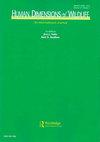Communicating uncertainty about the link between COVID-19 and bats: the indirect effects on attitudes toward bats in the United States
IF 1.7
4区 环境科学与生态学
Q2 BIODIVERSITY CONSERVATION
引用次数: 0
Abstract
ABSTRACT With its roots in zoonosis, the COVID-19 pandemic has made bat conservation more challenging. This study examines how communicating the varying levels of uncertainty regarding the association between bats and COVID-19 influences attitudes toward bats. An online, non-probability sample of 940 U.S. adults read messages about bats that portrayed the levels of uncertainty as either high or low, or did not read any message. The results show that a high- (vs. low-) uncertainty message led to less blame assigned to bats, contributing to a more positive attitude toward bats. Disgust and compassion mediated these effects. Overall, this study explicated an important yet rarely studied cognitive-emotional pathway concerning a stigmatized species that enriches the understanding of the role of message and psychological factors in influencing attitudes toward bats. Practically, when there are uncertainties associated with the causal link between infectious diseases and wildlife, it is better to communicate such uncertainties.传达COVID-19与蝙蝠之间联系的不确定性:对美国人对蝙蝠态度的间接影响
本文章由计算机程序翻译,如有差异,请以英文原文为准。
求助全文
约1分钟内获得全文
求助全文
来源期刊

Human Dimensions of Wildlife
Environmental Science-Nature and Landscape Conservation
CiteScore
4.40
自引率
12.50%
发文量
33
期刊介绍:
Human Dimensions of Wildlife is devoted to the study of social considerations in fisheries and wildlife management.
 求助内容:
求助内容: 应助结果提醒方式:
应助结果提醒方式:


